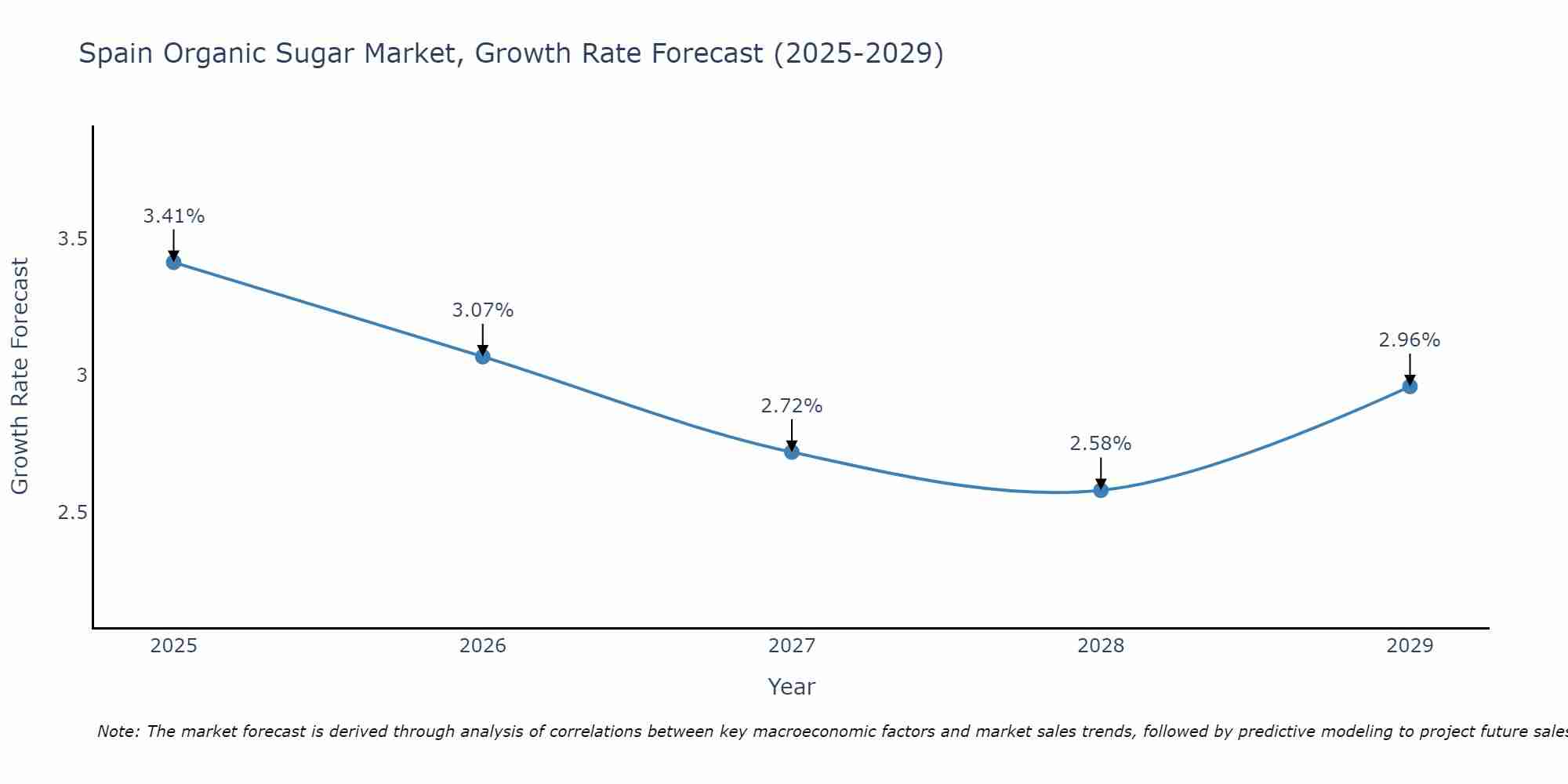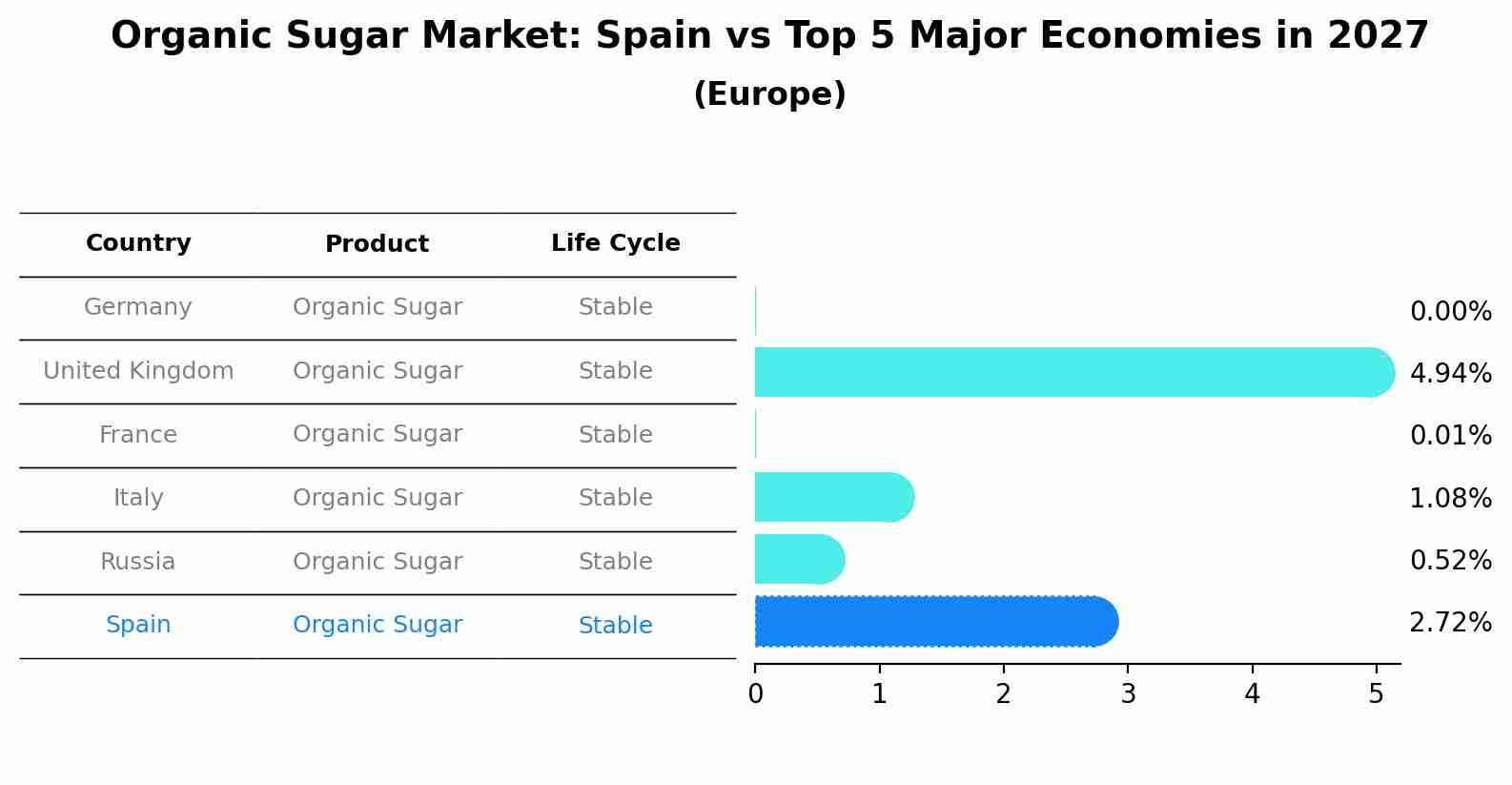Spain Organic Sugar Market Outlook | COVID-19 IMPACT, Forecast, Revenue, Companies, Value, Industry, Trends, Size, Analysis, Share & Growth
| Product Code: ETC109713 | Publication Date: Jun 2021 | Updated Date: Jun 2025 | Product Type: Report | |
| Publisher: 6Wresearch | Author: Shubham Padhi | No. of Pages: 70 | No. of Figures: 35 | No. of Tables: 5 |
Spain Organic Sugar Market Size Growth Rate
The Spain Organic Sugar Market is projected to witness mixed growth rate patterns during 2025 to 2029. Starting high at 3.41% in 2025, the market steadily declines to 2.96% by 2029.

Organic Sugar Market: Spain vs Top 5 Major Economies in 2027 (Europe)
The Organic Sugar market in Spain is projected to grow at a stable growth rate of 2.72% by 2027, within the Europe region led by Germany, along with other countries like United Kingdom, France, Italy and Russia, collectively shaping a dynamic and evolving market environment driven by innovation and increasing adoption of emerging technologies.

Spain Organic Sugar Market Overview
The Spain Organic Sugar Market is witnessing steady growth due to increasing consumer awareness about the benefits of organic products. Organic sugar, produced without synthetic chemicals or pesticides, is gaining popularity among health-conscious consumers seeking natural and sustainable alternatives to conventional sugar. The market is driven by the growing demand for organic and natural sweeteners in various food and beverage applications, including bakery products, confectionery, and beverages. Key players in the Spain Organic Sugar Market are focusing on product innovation, sustainable sourcing practices, and certifications to meet the rising consumer demand for organic and environmentally friendly products. The market is expected to continue its growth trajectory as more consumers prioritize health, sustainability, and ethical consumption practices in their purchasing decisions.
Spain Organic Sugar Market Trends
The Spain Organic Sugar Market is experiencing steady growth driven by increasing consumer awareness of health and sustainability. Consumers are seeking organic sugar products as a healthier alternative to conventional sugar, driving demand for organic sweeteners in various food and beverage applications. The trend towards clean label ingredients and natural products is also contributing to the market growth, with organic sugar being perceived as a more natural and environmentally friendly option. Key players in the market are focusing on product innovation, such as organic coconut sugar and organic cane sugar varieties, to cater to the evolving consumer preferences. Additionally, the rise of organic food and beverage industry in Spain is further fueling the demand for organic sugar products, indicating a positive outlook for the market in the foreseeable future.
Spain Organic Sugar Market Challenges
In the Spain Organic Sugar Market, several challenges are faced such as limited awareness and understanding among consumers regarding the benefits of organic sugar compared to conventional sugar. Another challenge is the relatively higher price point of organic sugar which makes it less competitive in the market. Additionally, the lack of consistent supply and sourcing difficulties for organic sugarcane pose challenges for producers and suppliers. Moreover, the regulatory framework and certification requirements for organic sugar production add complexity and costs to the process. Overall, increasing consumer education, addressing price differentials, improving supply chain logistics, and streamlining certification processes are key areas that need to be addressed to further develop the Spain Organic Sugar Market.
Spain Organic Sugar Market Investment Opportunities
The Spain Organic Sugar Market presents promising investment opportunities driven by increasing consumer demand for natural and organic products. With a growing focus on health and sustainability, there is a rising trend towards organic sweeteners as a healthier alternative to conventional sugars. Investing in organic sugar production or distribution in Spain could be lucrative due to the country`s favorable climate for sugar cultivation and a strong agricultural sector. Additionally, the EU`s strict regulations on organic farming and labeling provide credibility to organic sugar products, enhancing market potential. Collaborating with local organic sugar producers or establishing distribution channels for organic sugar in Spain could result in significant returns as the market continues to expand.
Spain Organic Sugar Market Government Policy
In Spain, government policies related to the organic sugar market focus on promoting sustainable agricultural practices and supporting the growth of organic farming. The Spanish government provides subsidies and incentives to farmers who transition to organic sugar production, aiming to increase the share of organically cultivated land in the country. Additionally, there are regulations in place to ensure the certification and labeling of organic sugar products, protecting consumers and promoting transparency in the market. The government also actively participates in international agreements and initiatives to promote organic agriculture and trade, further strengthening the position of Spanish organic sugar in the global market. Overall, government policies in Spain are geared towards fostering a thriving organic sugar industry that is environmentally friendly and economically sustainable.
Spain Organic Sugar Market Future Outlook
The Spain Organic Sugar Market is expected to witness steady growth in the coming years due to increasing consumer awareness and preference for organic products. Factors such as rising health consciousness, concerns about environmental sustainability, and demand for clean-label products are driving the market growth. The trend towards natural and organic sweeteners is expected to continue, with consumers seeking healthier alternatives to conventional sugar. Key players in the market are likely to focus on product innovation, sustainable sourcing practices, and expanding distribution channels to capitalize on the growing demand for organic sugar in Spain. Overall, the organic sugar market in Spain is poised for expansion, supported by changing consumer preferences and a growing market for organic food products.
Key Highlights of the Report:
- Spain Organic Sugar Market Outlook
- Market Size of Spain Organic Sugar Market, 2021
- Forecast of Spain Organic Sugar Market, 2027
- Historical Data and Forecast of Spain Organic Sugar Revenues & Volume for the Period 2018 - 2027
- Spain Organic Sugar Market Trend Evolution
- Spain Organic Sugar Market Drivers and Challenges
- Spain Organic Sugar Price Trends
- Spain Organic Sugar Porter's Five Forces
- Spain Organic Sugar Industry Life Cycle
- Historical Data and Forecast of Spain Organic Sugar Market Revenues & Volume By Source for the Period 2018 - 2027
- Historical Data and Forecast of Spain Organic Sugar Market Revenues & Volume By Sugar Beet for the Period 2018 - 2027
- Historical Data and Forecast of Spain Organic Sugar Market Revenues & Volume By Sugar Cane for the Period 2018 - 2027
- Historical Data and Forecast of Spain Organic Sugar Market Revenues & Volume By Others for the Period 2018 - 2027
- Historical Data and Forecast of Spain Organic Sugar Market Revenues & Volume By Application for the Period 2018 - 2027
- Historical Data and Forecast of Spain Organic Sugar Market Revenues & Volume By Food and Beverage for the Period 2018 - 2027
- Historical Data and Forecast of Spain Organic Sugar Market Revenues & Volume By Pharmaceutical for the Period 2018 - 2027
- Historical Data and Forecast of Spain Organic Sugar Market Revenues & Volume By Others for the Period 2018 - 2027
- Historical Data and Forecast of Spain Organic Sugar Market Revenues & Volume By Type for the Period 2018 - 2027
- Historical Data and Forecast of Spain Organic Sugar Market Revenues & Volume By Crystal Sugar for the Period 2018 - 2027
- Historical Data and Forecast of Spain Organic Sugar Market Revenues & Volume By Gelling Sugar for the Period 2018 - 2027
- Historical Data and Forecast of Spain Organic Sugar Market Revenues & Volume By Liquid Sugar for the Period 2018 - 2027
- Historical Data and Forecast of Spain Organic Sugar Market Revenues & Volume By Icing Sugar for the Period 2018 - 2027
- Spain Organic Sugar Import Export Trade Statistics
- Market Opportunity Assessment By Source
- Market Opportunity Assessment By Application
- Market Opportunity Assessment By Type
- Spain Organic Sugar Top Companies Market Share
- Spain Organic Sugar Competitive Benchmarking By Technical and Operational Parameters
- Spain Organic Sugar Company Profiles
- Spain Organic Sugar Key Strategic Recommendations
Frequently Asked Questions About the Market Study (FAQs):
- Single User License$ 1,995
- Department License$ 2,400
- Site License$ 3,120
- Global License$ 3,795
Search
Related Reports
- ASEAN and Thailand Brain Health Supplements Market (2025-2031) | Strategy, Consumer Insights, Analysis, Investment Trends, Opportunities, Growth, Size, Share, Industry, Revenue, Segments, Value, Segmentation, Supply, Forecast, Restraints, Outlook, Competition, Drivers, Trends, Demand, Pricing Analysis, Competitive, Strategic Insights, Companies, Challenges
- ASEAN Bearings Market (2025-2031) | Strategy, Consumer Insights, Analysis, Investment Trends, Opportunities, Growth, Size, Share, Industry, Revenue, Segments, Value, Segmentation, Supply, Forecast, Restraints, Outlook, Competition, Drivers, Trends, Demand, Pricing Analysis, Competitive, Strategic Insights, Companies, Challenges
- Europe Flooring Market (2025-2031) | Outlook, Share, Industry, Trends, Forecast, Companies, Revenue, Size, Analysis, Growth & Value
- Saudi Arabia Manlift Market (2025-2031) | Outlook, Size, Growth, Trends, Companies, Industry, Revenue, Value, Share, Forecast & Analysis
- Uganda Excavator, Crane, and Wheel Loaders Market (2025-2031) | Strategy, Consumer Insights, Analysis, Investment Trends, Opportunities, Growth, Size, Share, Industry, Revenue, Segments, Value, Segmentation, Supply, Forecast, Restraints, Outlook, Competition, Drivers, Trends, Demand, Pricing Analysis, Competitive, Strategic Insights, Companies, Challenges
- Rwanda Excavator, Crane, and Wheel Loaders Market (2025-2031) | Strategy, Consumer Insights, Analysis, Investment Trends, Opportunities, Growth, Size, Share, Industry, Revenue, Segments, Value, Segmentation, Supply, Forecast, Restraints, Outlook, Competition, Drivers, Trends, Demand, Pricing Analysis, Competitive, Strategic Insights, Companies, Challenges
- Kenya Excavator, Crane, and Wheel Loaders Market (2025-2031) | Strategy, Consumer Insights, Analysis, Investment Trends, Opportunities, Growth, Size, Share, Industry, Revenue, Segments, Value, Segmentation, Supply, Forecast, Restraints, Outlook, Competition, Drivers, Trends, Demand, Pricing Analysis, Competitive, Strategic Insights, Companies, Challenges
- Angola Excavator, Crane, and Wheel Loaders Market (2025-2031) | Strategy, Consumer Insights, Analysis, Investment Trends, Opportunities, Growth, Size, Share, Industry, Revenue, Segments, Value, Segmentation, Supply, Forecast, Restraints, Outlook, Competition, Drivers, Trends, Demand, Pricing Analysis, Competitive, Strategic Insights, Companies, Challenges
- Israel Intelligent Transport System Market (2025-2031) | Strategy, Consumer Insights, Analysis, Investment Trends, Opportunities, Growth, Size, Share, Industry, Revenue, Segments, Value, Segmentation, Supply, Forecast, Restraints, Outlook, Competition, Drivers, Trends, Demand, Pricing Analysis, Competitive, Strategic Insights, Companies, Challenges
- Uganda Precast and Aggregate Market (2025-2031) | Strategy, Consumer Insights, Analysis, Investment Trends, Opportunities, Growth, Size, Share, Industry, Revenue, Segments, Value, Segmentation, Supply, Forecast, Restraints, Outlook, Competition, Drivers, Trends, Demand, Pricing Analysis, Competitive, Strategic Insights, Companies, Challenges
Industry Events and Analyst Meet
Our Clients
Whitepaper
- Middle East & Africa Commercial Security Market Click here to view more.
- Middle East & Africa Fire Safety Systems & Equipment Market Click here to view more.
- GCC Drone Market Click here to view more.
- Middle East Lighting Fixture Market Click here to view more.
- GCC Physical & Perimeter Security Market Click here to view more.
6WResearch In News
- Doha a strategic location for EV manufacturing hub: IPA Qatar
- Demand for luxury TVs surging in the GCC, says Samsung
- Empowering Growth: The Thriving Journey of Bangladesh’s Cable Industry
- Demand for luxury TVs surging in the GCC, says Samsung
- Video call with a traditional healer? Once unthinkable, it’s now common in South Africa
- Intelligent Buildings To Smooth GCC’s Path To Net Zero













